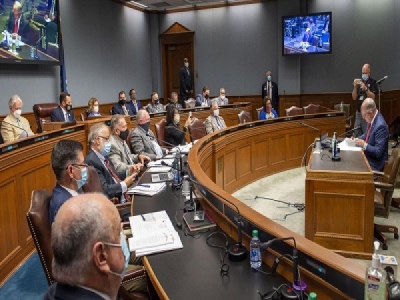
Posted on August 24, 2020
Louisiana will strive to reach a “net zero” level of greenhouse gas emissions by 2050 to play its part in a worldwide effort to limit the effects of global warming that threaten the state’s coast and its residents and businesses, Gov. John Bel Edwards said Wednesday before signing two executive orders that will guide the state’s efforts to both reduce emissions and deal with the effects of warming.
“In many ways, Louisiana is the poster child for climate risk. We are the canary in the coal mine,” Edwards said in explaining his plan , delivered during a meeting of the state Coastal Protection And Restoration Authority. “Beginning today, we want to be the gold standard for climate solutions.”
One of Edwards’ executive orders creates a task force of representatives of government, industry and civic and environmental groups that will recommend strategies, policies and incentives by February 2022 aimed at meeting an interim goal of a 26 to 28% reduction in greenhouse gases by 2025, a 40 to 50% reduction by 2030 and reductions resulting in “net zero” emissions by 2050.
A year later, the task force is required to submit a detailed plan showing how those goals would be met, which would also be given to the Legislature for possible action.
However, the initial 2025 reduction goal occurs after the end of Edwards’ second term, and there’s no language in the executive order specifying how the goals would be met.
In his February announcement that he would form the task force, Edwards said that he’d like to work with industry to get facilities to voluntarily reduce emissions, while Department of Environmental Quality Secretary Chuck Carr Brown pointed out then that the state does have the ability to mandate carbon emission reduction through its enforcement of federal regulations.
The state hopes to rely on its own coastal restoration efforts — rebuilding wetlands that can remove carbon from the air and permanently store it in soils — and on creating financial incentives for the oil and gas industry to develop their own played-out oil and gas fields deep underground to permanently store carbon emissions captured from their own operations, and possibly from the state’s petrochemical facilities.
Source: Coastal News Today





